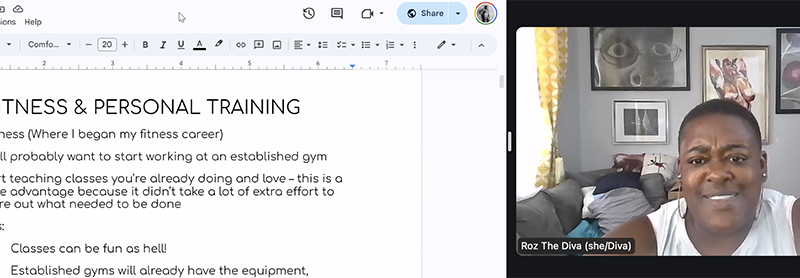[memberonly level=“Group Membership for Businesses of 2-5 individuals, Student, Individual or Solo-Preneur”] Please note that…

How to Start Your Own Pole Business
So you want to start your own business? Maybe it’s a studio, maybe it’s creating a new grip, maybe it’s an event. You’ve got a great idea, some extra time on your hands and now you are ready to be your own boss. Sound familiar? Then read on!
All businesses start in the same way: figuring out what you’re doing and why you’re doing it. Begin this conversation with yourself and your trusted support system such as a spouse or friends, formally or informally answering those questions. You can use a formal process like a SWOT analysis or just hash it out. Maybe you want to create a formal business plan, or talk to some investors and maybe you don’t want to talk to investors. Presuming you’ve done some level of thinking and researching, these are the next steps you’ll need to become an entrepreneur and officially start your business.
Make it official: register your business
The first step to opening your business is to actually file the paperwork. Only two things in life are guaranteed: death and taxes and you’re about to add a new level of complexity to your annual IRS filing. First decide what is the best corporate structure for you. In the US, generally your business is either a LLC (limited liability company) or a corporation (C or S corp). There are a few other options (especially if you want to be a non-profit) but those are the most common. Each has different benefits and drawbacks. Read this post to learn more about legal structures for pole businesses.
Not sure which is good for you? Check out this online wizard that asks several questions about how you envision starting and ending your business.
Once you determine which type of business is best for you, you need to tell your state and officially register. You can file with your state or if you want extra help there are LOTS of companies like Incorporate.com, mycorporation.com and Bizfilings.com that will file for you, for a fee.
If you want to be a LLC, this website has a ton of resources about the specific details for your state. Every state is slightly different so make sure to read all the information.
If you expect to have employees (you can have them no matter which business structure you choose or in some states if you have more than one member in your LLC), you will also need to file for an EIN (employer identification number) which you will do with the IRS or through one of the companies listed above.
Depending on what business you create and what state you live in (or choose to put your business in), there may be lots of other paperwork to file and lots of other fees to pay. You may have to register for a home-based business if your home is your place of business. You may need to apply for a specific trade name if you are not allowed to conduct business using the name of your LLC. If you don’t use a service to help you, make sure you read everything on your state’s website and if you have questions it’s best to visit them in person and ask.
Banking, Bookkeeping, Accounting, Taxes and Audits
Set up a new bank account for your business. Depending on your state and your business structure you may need lots of different paperwork to actually set up your bank account. Do your research and confirm what you need before you go to the bank. You may want to bank at the same place you have your personal accounts or not, see what benefits the bank may provide for being a loyal customer. If you intend to have employees, you may choose to have two accounts: one for operations and one for payroll. Keep all your business expenses as separate as possible from your personal and save your receipts (hardcopy and digital). It can be tough when you are just starting out but worth it in case you get audited (more on that later).
If you like learning new things or have an interest in finance, you can very easily do your own bookkeeping using modern tools. Bookkeeping is keeping track of all your financial transactions. There are lots of software to help such as Quickbooks and lots of online services like Bench or Xero which works with online credit card processors/schedulers. You can also find a local bookkeeper or company that does bookkeeping to help you. You could also do a little bit of both such as finding a bookkeeper to set up the file/the system then keep it updated following their lead if you are comfortable inputting information.
The good news is, a lot of things you were paying for before you opened your business can now be business expenses deducted from your taxes. Any training you do such as paying for classes, private sessions, traincations, going to PoleCon, etc. can be classified as education expenses including the travel there and ticket/workshop expenses. You may even be able to write off clothing as “uniforms” – if you can prove you don’t wear leggings and booty shorts in your muggle life. Buying yourself that yoga wheel or a new lyra is equipment.
If you do your own bookkeeping, have a CPA (certified public accountant) review your books and file your taxes (many of them are also tax preparers but also ask to confirm). If you are a LLC then they will also prepare your personal taxes. Not ready for that expense or just like to do it yourself? Try TurboTax. For relatively simple businesses with no employees (or just you) this is a great option. You might want to add their audit defense service though, just in case. Read more about taxes here.
Make sure you file your taxes. It may take a while, but the IRS will find you. If you are a consultant, independent contractor or small business owner then you are already a higher priority to be audited than the average person who works a salaried job. EVEN if you don’t make that much money.
Hiring Employees
If you are a studio owner, you likely will hire employees. You can hire independent contractors but be very careful. If your instructors are your employees they are covered under your insurance. If they don’t work anywhere else (and work for you more like full time 30+ hours a week) then you could be audited by the state for skirting employment laws and not paying appropriate employment payroll related taxes. Payroll can be complicated to manage especially if you have people working for you that live in different states all with different laws and if you offer other benefits like health insurance or retirement benefits. Some software like QuickBooks allows you to run payroll through the software. Otherwise try using a service like https://gusto.com/ or http://www.paychex.com/ that will make sure you are compliant with all laws and tax rates while also offering the flexibility of a payroll that might change from week to week like a pole studio.
If you choose to use independent contractors then for every person who is an individual or their own LLC who you pay more than $600 in a year MUST fill out a W9 form so that at the end of the year you send them a 1099-MISC form reporting their earnings. You file a copy with the IRS and they should file a copy with their taxes. You can be fined if you do not do this. Also, if you have independent contractors doing work for you they should have their own insurance and list you as an additional insured. This is true for people who travel to do workshops at your studio/event as well.
Whether you have employees or consultants you may want to consider having a non-compete agreement (NCA). Laws vary from state to state as do their usefulness. Do your research and decide what contracts are most appropriate and legally necessary for your staff.
Get Insurance
If you have employees then you need worker’s compensation insurance (worker’s comp) in case someone is injured. You should also have general liability insurance whether or not you have employees. Aerial (not just pole) studios and instructors may have trouble accessing general liability insurance because of perceived (not necessarily real) liability issues. Do your research and find the best option for you. Insurance may not seem like a need immediately however some organizations, partners, events, other companies and other situations may require general liability or other specialized insurance in specific interactions. Forbes recommends these 13 (13!!!) types of insurance every small business owner should have. We’ve got a slightly shorter list at this link.
Insurance is something that many people are frustrated with – you seem to pay and pay and pay and for what? Honestly, you don’t want to ever have to actually test the “for what.” If someone is hurt, if your business is broken into or a thousand other terrible things that could happen (many of which have happened to my businesses – one of which was robbed three times in one year) then insurance will absolutely be worth it. Hear the best type of pole insurance you need as studio owner or instructor from one of our partners.
Now start working!
Now that you’ve set up everything to do with your business, it’s time to actually start working – whew! The good news is, most of the things you just went through like registering your business and establishing a bank account you never need to do again. Pay attention to the things that need to be re-filed every year with your state or municipality or every other year particularly those things with fees, which can rack up penalties if you’re late.
If you’re tired just reading this, don’t worry, it’s not your imagination – this sh*t is hard, although working for yourself can absolutely be worth it.



